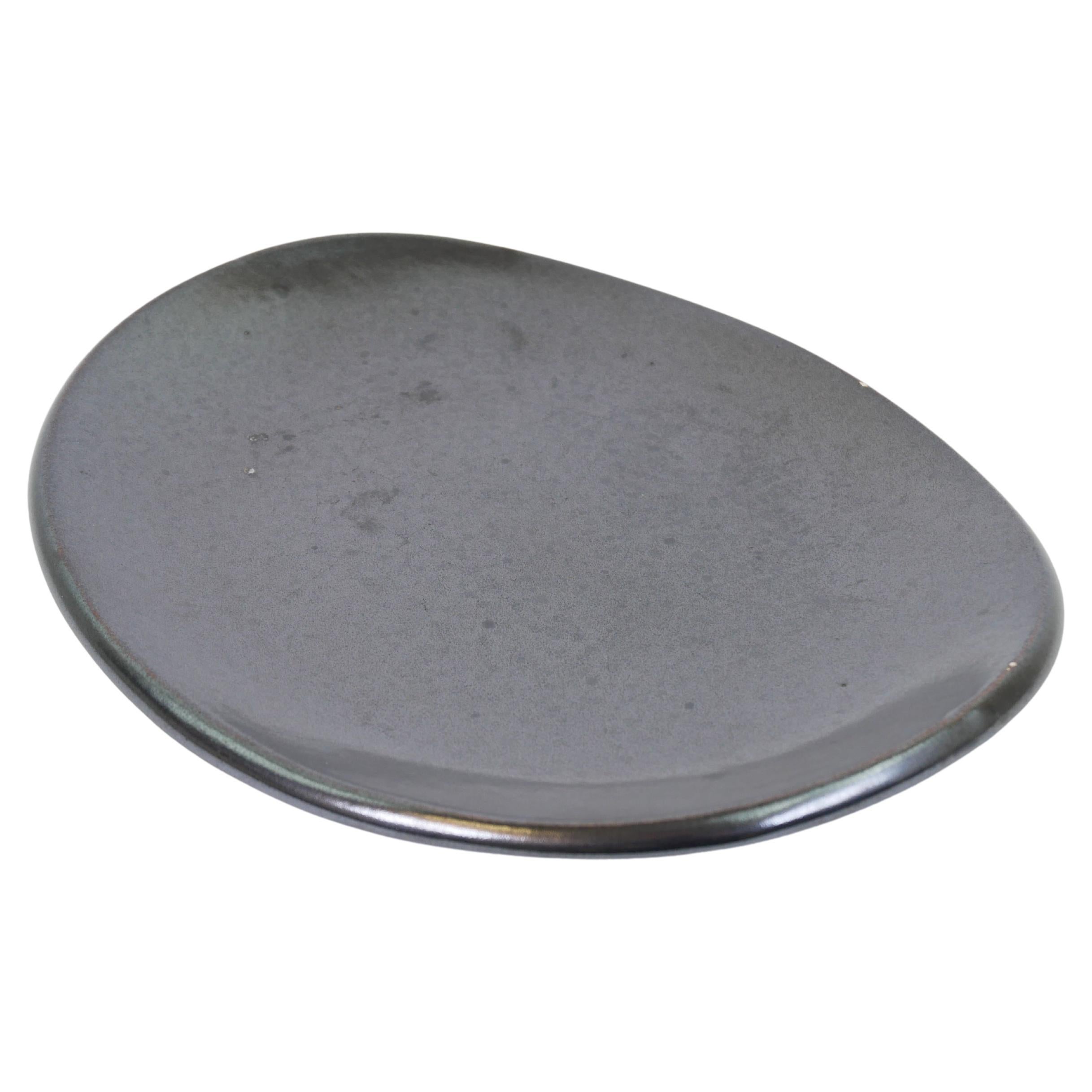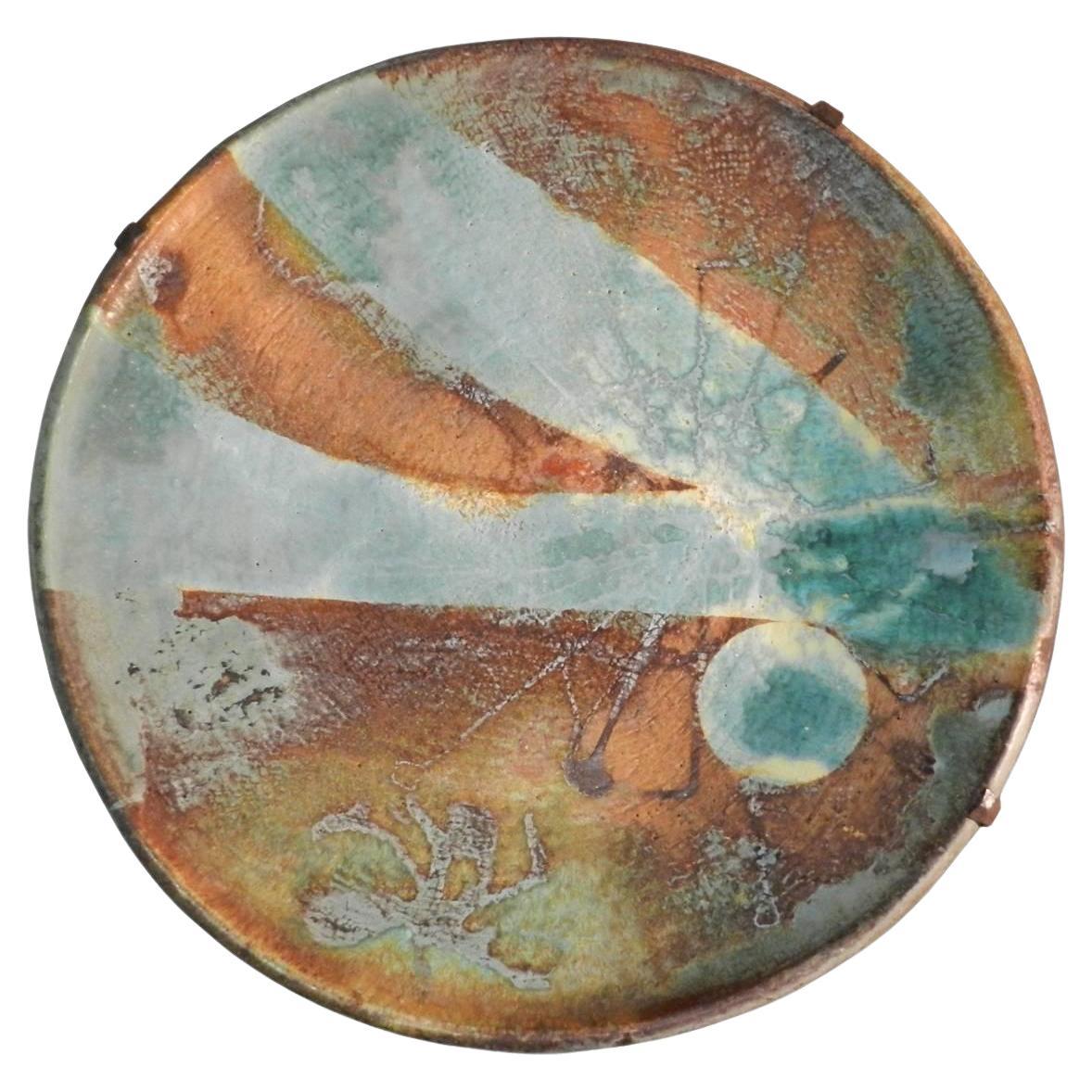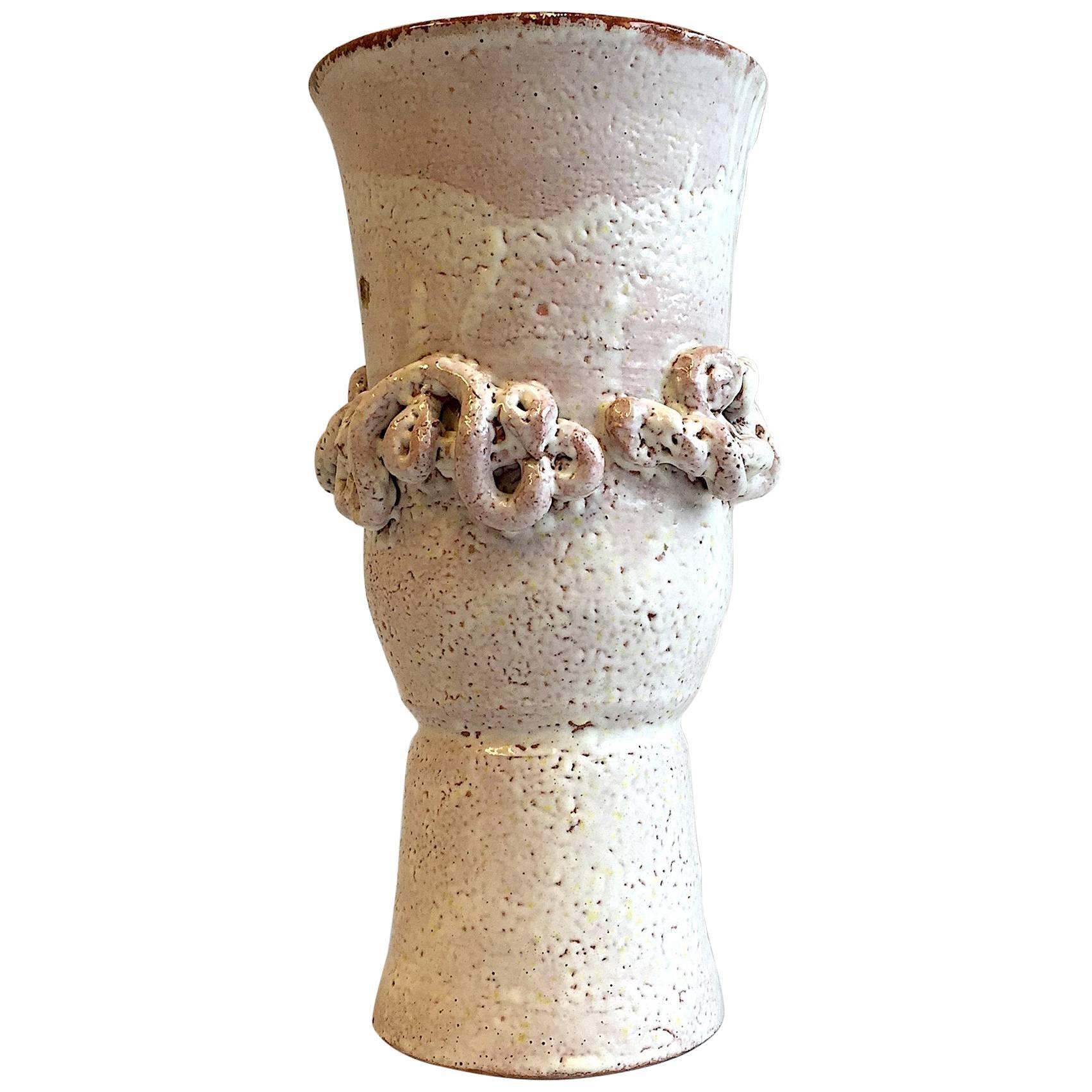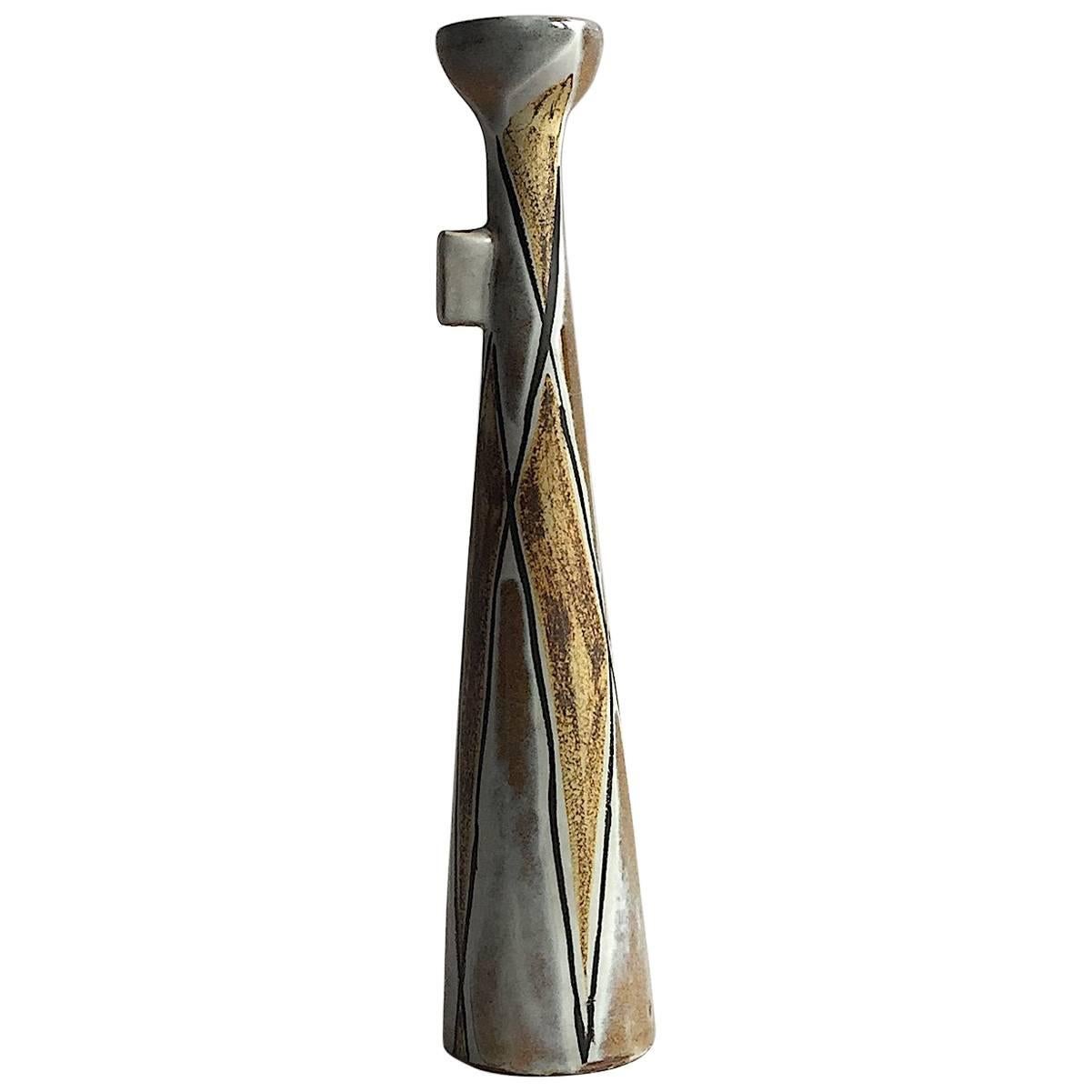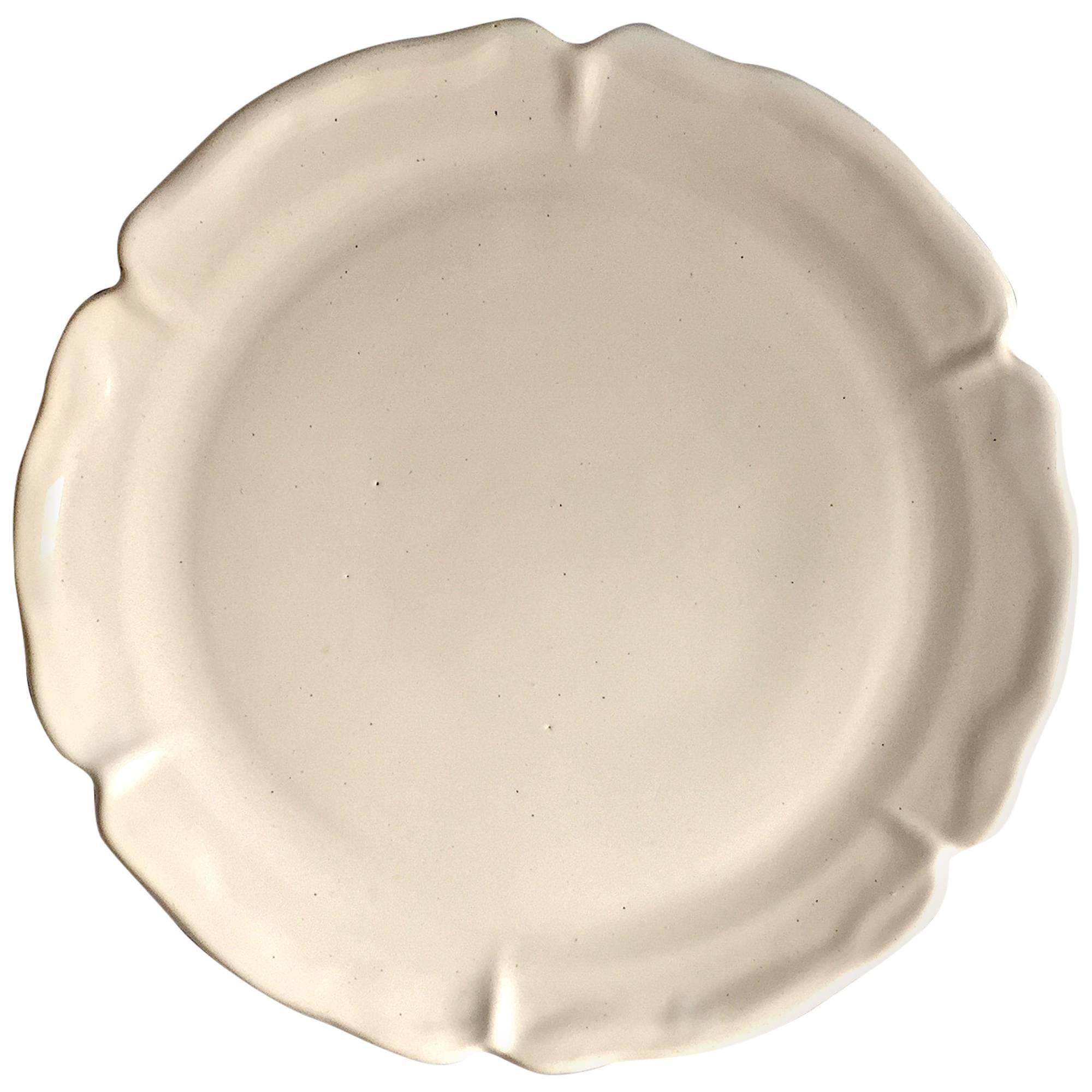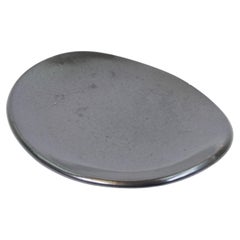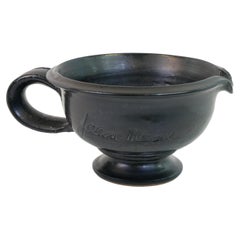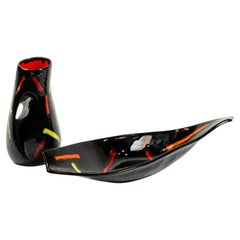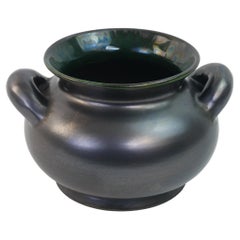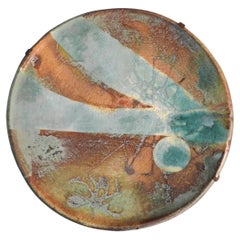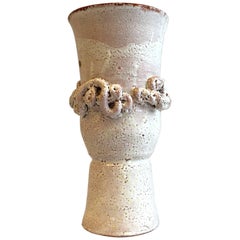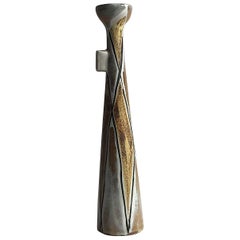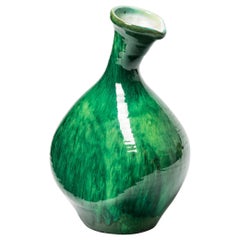Items Similar to Green ceramic leaf tidy by Madoura Vallauris circa 1950
Want more images or videos?
Request additional images or videos from the seller
1 of 21
Green ceramic leaf tidy by Madoura Vallauris circa 1950
About the Item
This vibrant green glazed ceramic plate is a striking example of Madoura’s artistry. Shaped like a stylized leaf, it captures both elegance and a touch of whimsy. The glossy glaze highlights the embossed veins and organic contours of the piece, enhancing its naturalistic charm. Its vivid green hue brings a fresh, lively energy, making it ideal as a decorative accent or functional serving dish. The plate is signed on the base with the iconic Plein Feu stamp, attesting to its origin at the Madoura workshop and its high-temperature firing process, which guarantees exceptional finish and durability. Each curve and detail reflects Madoura’s commitment to craftsmanship and artistic vision. Whether part of a collection or used on a modern table, this piece stands as a testament to timeless ceramic tradition.
Madoura, located in Vallauris, France, is a legendary ceramics studio celebrated for its artisanal excellence and collaborations with Picasso, producing iconic works that blend tradition with artistic innovation.
Good condition. More information Upon Request.
- Creator:Suzanne Ramie (Designer),Madoura (Manufacturer)
- Dimensions:Height: 1.19 in (3 cm)Width: 10.24 in (26 cm)Depth: 6.89 in (17.5 cm)
- Style:Mid-Century Modern (Of the Period)
- Materials and Techniques:
- Place of Origin:
- Period:
- Date of Manufacture:Circa 1950
- Condition:Wear consistent with age and use. Minor losses.
- Seller Location:NICE, FR
- Reference Number:Seller: STLDCER0351stDibs: LU10127244665442
About the Seller
No Reviews Yet
Vetted Professional Seller
Every seller passes strict standards for authenticity and reliability
Established in 2023
1stDibs seller since 2024
- ShippingRetrieving quote...Shipping from: Mougins, France
- Return Policy
Authenticity Guarantee
In the unlikely event there’s an issue with an item’s authenticity, contact us within 1 year for a full refund. DetailsMoney-Back Guarantee
If your item is not as described, is damaged in transit, or does not arrive, contact us within 7 days for a full refund. Details24-Hour Cancellation
You have a 24-hour grace period in which to reconsider your purchase, with no questions asked.Vetted Professional Sellers
Our world-class sellers must adhere to strict standards for service and quality, maintaining the integrity of our listings.Price-Match Guarantee
If you find that a seller listed the same item for a lower price elsewhere, we’ll match it.Trusted Global Delivery
Our best-in-class carrier network provides specialized shipping options worldwide, including custom delivery.More From This Seller
View AllLovely black ceramic plate or tidy by Madoura Plein Feu Vallauris circa 1950
By Madoura
Located in NICE, FR
This elegant black glazed ceramic plate showcases the refined craftsmanship of the renowned Madoura workshop. With its soft asymmetrical form and deep, lustrous black glaze, the piece exudes a minimalist yet organic aesthetic. The surface has subtle variations in tone, enhancing its handmade character. Under the base, it bears the distinctive Plein Feu stamp, a hallmark of authentic Madoura production, signifying high-temperature firing that ensures durability and brilliance. This piece is not only functional but also collectible, embodying the legacy of fine Provençal ceramics...
Category
Vintage 1950s French Mid-Century Modern Ceramics
Materials
Ceramic
Black ceramic jug by Jean Marais, Vallauris circa 1950
By Jean Marais
Located in NICE, FR
This ceramic pouring vessel, crafted by Jean Marais, showcases a refined black glaze with a smooth, slightly glossy finish. It features a rounded body that elegantly tapers into a pe...
Category
Vintage 1950s French Mid-Century Modern Ceramics
Materials
Ceramic
Funky 90's Ceramic Set, Vase and Tidy from Vallauris, France
By Vallauris
Located in NICE, FR
Very groovy ceramic set, Vase and Tidy with black glazed. Typical decor from the French Vallauris 90's style. Pop and decorative.
vase-like sculpture features a narrow opening with ...
Category
1990s French Post-Modern Ceramics
Materials
Ceramic
Wonderful Vide Poche attributed at Suzanne Ramié for Madoura Vallauris
By Madoura, Suzanne Ramie
Located in NICE, FR
This is a sleek, handcrafted black ceramic vase attributed to Suzanne Ramié for Madoura Vallauris. The vase features a rounded, minimalist design wit...
Category
Vintage 1950s French Mid-Century Modern Decorative Dishes and Vide-Poche
Materials
Ceramic
Green ceramic Gargoulette by Robert Picault, Vallauris, France
By Robert Picault
Located in NICE, FR
This gargoulette by Robert Picault embodies his signature style and functionality. Typically crafted from terracotta, this double-handled water pitcher features a spherical body and ...
Category
Vintage 1950s French Mid-Century Modern Ceramics
Materials
Ceramic
Charming baby blue ceramic vase by Jean Gerbino Vallauris circa 1940
By Jean Gerbino
Located in NICE, FR
This is a vintage ceramic vase from the 1940s, signed under the base by Jean Gerbino. Characteristic of his signature "millefiori" mosaic technique, this vase features intricate geom...
Category
Vintage 1940s French Mid-Century Modern Ceramics
Materials
Ceramic
You May Also Like
Madoura, Very Large Ceramic Platter Attributed to Suzanne Ramie, Vallauris
By Suzanne Ramie, Madoura
Located in Saint-Ouen, FR
Madoura, very large ceramic platter attributed to Suzanne Ramie, Vallauris.
Category
Vintage 1960s French Mid-Century Modern Ceramics
Materials
Ceramic
Madoura Vase Vallauris
By Madoura
Located in Munich, DE
Vallauris Madoura vase, France, 1960
Madoura Plein Feu stamp, (hard to see) Suzanne Ramie
Measures: H 29 , D 14 bottom cm.
Category
Vintage 1960s French Mid-Century Modern Ceramics
Materials
Ceramic
$3,240
Madoura Vase Vallauris
By Madoura
Located in Munich, DE
Vallauris Madoura vase, France, 1960.
Madoura Plein Feu Stamp, Suzanne Ramie
H 30,5 , D 6,5 bottom cm.
Category
Vintage 1960s French Mid-Century Modern Ceramics
Materials
Ceramic
$2,430
Green and White Free Form Ceramic Vase circa 1950 French Design Style of Madoura
By Madoura
Located in Neuilly-en- sancerre, FR
Ceramic vase
Original free form ceramic vase with white and green ceramic glazes colors
Perfect condition
In the style of MADOURA 20th ...
Category
Mid-20th Century French Mid-Century Modern Vases
Materials
Ceramic
Suzanne Ramie, Madoura, Large White Plate
By Madoura, Suzanne Ramie
Located in Munich, DE
Suzanne Ramié (1907-1974,) France.
Ceramic large white plate by renowned France artist Suzanne Ramié having a white-milky glaze. Stamped on th...
Category
Vintage 1950s French Mid-Century Modern Ceramics
Materials
Stoneware
Ceramic Plate Visage Gris 'Grey Face' A.R. 206 by Pablo Picasso & Madoura, 1953
By Pablo Picasso, Madoura
Located in New York, NY
The engraved and brush painted ceramic plate, Visage Gris (Grey Face) is one the most iconic pieces created by Pablo Picasso (1881 - 1973) at the Madoura workshop in Vallauris, France. It is said "all portraits are self portraits". In this work, we see Picasso's wistfulness, vulnerability and humor set within a beautiful image representing both the sun and the moon, the masculine and the feminine. Picasso mastery of form, image, composition and subtle color is evident in a work that resonates transcendence.
Created in 1953, Pablo Picasso ceramic Visage Gris (Grey Face), 1953 A.R. 206 is a Madoura white earthenware clay, knife engraved under partial brushed glaze with decoration in engobes (green, black, white) from the edition of 500. This work is stamped with the 'Madoura PLEIN FEU' and ‘EMPREINTE ORIGINALE DE PICASSO’ pottery stamps on the reverse. Dimensions: 12 3/8 x 15 1/8 x 1 5/8in (31.4 x 38.3 x 4.1cm). Madoura was an artisan workshop created by Georges and Suzanne Ramie which collaborated with Picasso in the fabrication and hand painting of the works.
Pablo Picasso designed 633 different ceramic editions between 1947 and 1971 at the Madoura workshop, with a number of variants and unique pieces resulting from these initial works. He began by creating simple, utilitarian objects such as plates and bowls, but later produced more complex forms, including pitchers and vases — their handles occasionally shaped to form facial features, or anatomical parts of his animal subjects.
Picasso remains one of the highest-grossing artists at auction today, and the range of his ceramics means it's possible to find both a good investment and a beautiful object. Visage Gris is among the most important.
A Short Biography follows:
Pablo Picasso revolutionized the art world and to many is THE artist of the 20th century. He is famous for his role in pioneering Cubism with Georges Braque and for his melancholy Blue Period pieces. Original signed Picasso lithographs and prints are a sure investment. Madoura Picasso ceramics are highly collectible in their own right.
As one of the most influential Modern artists of the 20th century, Pablo Picasso is renowned as a legendary artistic master to this day. Born on October 25, 1881 in Malaga, Spain, Pablo Picasso was a child prodigy who was recognized as such by his art-teacher father, who ably led him along. The small Museo de Picasso in Barcelona is devoted primarily to his early works, which include strikingly realistic renderings of casts of ancient sculpture.
Picasso was a rebel from the start and, as a teenager, began to frequent the Barcelona cafes where intellectuals gathered. He soon went to Paris, the capital of art, and soaked up the works of Edouard Manet, Gustave Courbet, and Henri de Toulouse-Lautrec, whose sketchy style impressed him greatly. Then it was back to Spain, a return to France, and again back to Spain – all in the years 1899 to 1904.
Before he struck upon Cubism, Picasso went through a prodigious number of styles – realism, caricature, the Blue Period, and the Rose Period. These distinguished styles are apparent in the unique original works as well as Picasso ceramics, lithographs, linocuts, and etchings that he created later in his life.
The Blue Period dates from 1901 to 1904 and is characterized by a predominantly blue palette and focuses on outcasts, beggars, and prostitutes. This was when he also produced his first sculptures. The most poignant work of the style, La Vie (1903), currently located in Cleveland’s Museum of Art, was created in memory of his childhood friend, the Spanish poet Carlos Casagemas, who had committed suicide. The painting started as a self-portrait, but Picasso’s features became those of his lost friend. The composition is stilted, the space compressed, the gestures stiff, and the tones predominantly blue.
The Rose Period began around 1904 when Picasso’s palette brightened and is dominated by pinks and beiges, light blues, and roses. His subjects are saltimbanques (circus people), harlequins, and clowns, all of whom seem to be mute and strangely inactive. One of the premier works of this period is Family of Saltimbanques (1905), currently in Washington, D.C. at the National Gallery, which portrays a group of circus workers who appear alienated and incapable of communicating with each other, set in a one-dimensional space.
In 1905, Picasso went briefly to Holland, and on his return to Paris, his works took on a classical aura with large male and female figures seen frontally or in distinct profile, as in early Greek art. One of the best examples of this style is in the Albright-Knox Gallery in Buffalo, NY, La Toilette (1906). Several pieces in this new, classical style were purchased by Gertrude Stein (the art patron and writer) and her brother, Leo Stein.
With his groundbreaking 1907 painting Les Demoiselles d’Avignon...
Category
Mid-20th Century French Mid-Century Modern Figurative Sculptures
Materials
Earthenware
